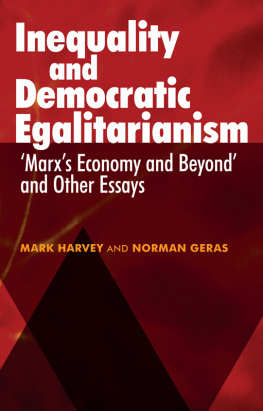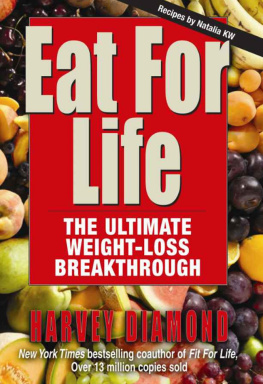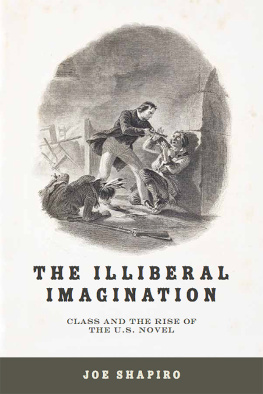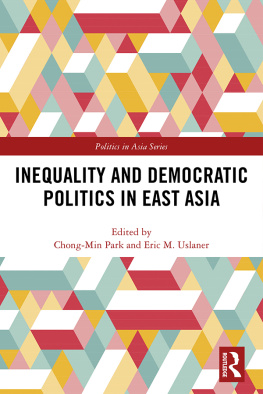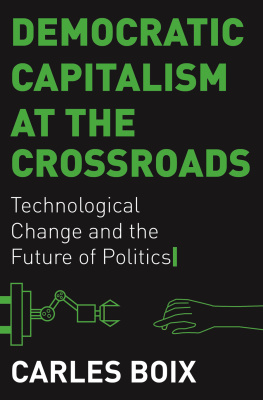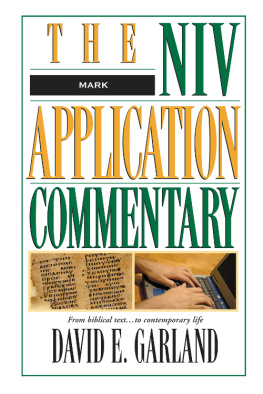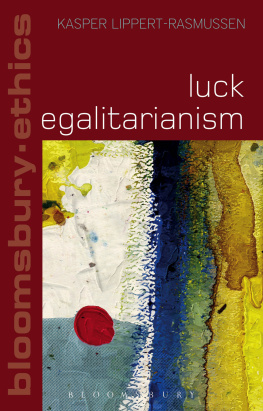Mark Harvey - Inequality and Democratic Egalitarianism
Here you can read online Mark Harvey - Inequality and Democratic Egalitarianism full text of the book (entire story) in english for free. Download pdf and epub, get meaning, cover and reviews about this ebook. year: 2018, publisher: Manchester University Press, genre: Politics. Description of the work, (preface) as well as reviews are available. Best literature library LitArk.com created for fans of good reading and offers a wide selection of genres:
Romance novel
Science fiction
Adventure
Detective
Science
History
Home and family
Prose
Art
Politics
Computer
Non-fiction
Religion
Business
Children
Humor
Choose a favorite category and find really read worthwhile books. Enjoy immersion in the world of imagination, feel the emotions of the characters or learn something new for yourself, make an fascinating discovery.
- Book:Inequality and Democratic Egalitarianism
- Author:
- Publisher:Manchester University Press
- Genre:
- Year:2018
- Rating:3 / 5
- Favourites:Add to favourites
- Your mark:
- 60
- 1
- 2
- 3
- 4
- 5
Inequality and Democratic Egalitarianism: summary, description and annotation
We offer to read an annotation, description, summary or preface (depends on what the author of the book "Inequality and Democratic Egalitarianism" wrote himself). If you haven't found the necessary information about the book — write in the comments, we will try to find it.
Inequality and Democratic Egalitarianism — read online for free the complete book (whole text) full work
Below is the text of the book, divided by pages. System saving the place of the last page read, allows you to conveniently read the book "Inequality and Democratic Egalitarianism" online for free, without having to search again every time where you left off. Put a bookmark, and you can go to the page where you finished reading at any time.
Font size:
Interval:
Bookmark:
Journeying through Marxism
This book is the unlikely product of two people who somehow managed to collaborate across what was historically a yawning sectarian chasm: one with a Trotskyist formation (Norman Geras) and one with a Maoist one (myself). This by no means exhausts the possible incompatibilities between someone with a long and prolific academic career, and someone with a truncated one; a dedicated political philosopher, and a disciplinary floater between history, political economy and sociology. And yet, close friends from undergraduate days in the early 1960s, we remained so until and beyond Norman's untimely death in 2013. We met as undergraduates in Oxford in 1961, Norman having just arrived from Zimbabwe, myself a Londoner. We shared a passion for the cinema, then experiencing the experimentations of the New Wave. Typical of the forced choices demanded many years later on Norm's blog, Beethoven was the best classical composer (Norm) and so was Bach (me). Only one correct answer. But it was politics that drew us together, including Norm's anti-imperialist support for any ex-colonial team that could beat England at cricket. We both survived the Cuban missile crisis (just), and were struck by how Oxford University pretended it wasn't happening, along with the rest of life outside its complacent elitism and privileged rituals.
Across potentially insurmountable sectarian and experiential divides, both wedded to historical materialism and realism, over the years we had many never-ending discussions and some fruitfully interminable disagreements. Yet, late in life we found how we surprisingly agreed on Marx, and how to move forward from Marx, and so decided to write a short book, succeeding only in completing an extended essay before he died: Marx's Economy and Beyond, which appears below as the centrepiece of this volume. Norman had never written a co-authored piece, an aspect of his single-mindedness. He also would never countenance any alterations by anyone of any text he had deemed finished: not even a comma to be added or subtracted. So the text of that essay in this book is as he approved.
When we met in the early 1960s, we were already both politically committed adherents to a historical materialist understanding of capitalism, and, even before university, had embraced Marx's Capital, the Communist Manifesto, the early Economic and Philosophical Manuscripts as foundational works influencing world history. Later, although by then in divergent political trends, we had each at taken part in groups dedicated to systematically Reading Marx, inspired by Althusser, although neither of us swallowed either his theoreticism or his particular political reading of Marx.
), reflected a shared interest in the epistemology of historical materialism, and of Marx's understanding of the scientific status of his political economy. Norm's route to developing this interest had been through careful exegesis of Marx's texts, in this case the idea that the appearance of prices attached to commodities in markets was a real phenomenon rather than an illusion, but one that required a scientific understanding of the underlying processes generating variations in price, which for Marx lay in the variations in the abstract labour time embodied in them. It is no accident that the essay in this volume returns to that important point of departure for us both. But, my route to adopting this realist theoretical epistemology had been a doctoral thesis on, and then a post-doctoral research fellowship with, Jean Piaget, and the dialectical materialist epistemology advocated by him. Rejecting both social constructionist and philosophically a priori epistemologies, we broadly shared an epistemological outlook, although one as a political philosopher, the other as a theoretical and empirical social scientist. That was an important condition for being able to discuss issues such as a universalist position on human nature (Norm's) and disagree, because at least we did agree on what sort of argument or evidence counted.
). That is more than echoed in the central theme of this book.
and his subsequent retraction of war as the means to do so: a moral and political quandary which he faced unflinchingly.
I followed a more unorthodox life course. After a brief spell as a university lecturer, I quit academia to become a building labourer, much influenced by the political atmosphere of the times (the Chinese cultural revolution, the anti-imperialist Third World movements, and the student and women's movements). I was employed in a Labour-controlled local government direct labour organisation, building, converting, and maintaining social housing then publicly owned by the municipality. For the next seventeen years, I was an active trades unionist, both within a workforce (with 1500 workers in 1974 when I started) and developing links with tenants associations. In spite of never disguising my class and educational background, I was a democratically elected to be shop steward, chair of the shop stewards committee and convenor steward for several spells.
).
However, the 1979 election of Thatcher with a radical right pro-market politics changed everything. Within months, a moratorium was placed on all new council housing building, followed by the imposition of compulsory (i.e. rigged) competitive tendering for all work undertaken a political strategy pioneered in the building industry. From then on, as Direct Labour Organisations lost work, we were subject to successive waves of redundancy rippling right across the public sector construction industry in the country. Moreover, this attack on public-sector production was complemented by the highly subsidised sale of publicly owned housing stock to sitting tenants. I was finally made redundant in 1991, when only 65 direct labour building workers remained from the initial 1974 workforce, and council-owned housing stock had been reduced by more than half. The union struggles against the waves of redundancy were the bitterest of all: the effects on life-long building workers devastating, indeed, in a small minority of cases, lethal.
For me, personally and politically, the experience was life-changing across many dimensions. Here, I will only briefly summarise a couple of key aspects of direct relevance to the main themes of this book. The first involves a radical revision of the understanding of markets, which were assumed by Marx to be perfect in terms of competition, price setting, value determining, whether for labour, capital or all forms of commodity, in intermediate markets for inputs into commodity markets, or end markets for consumers. The privatisations of the Thatcher government were what I now understand as politically instituted markets, of which Direct Labour Organisations were but a small if pioneering example. The government determined what kind of enterprise could compete over what kind of contracts. They set the rules of competition. In many instances, price regulation and rates of return on capital were politically fixed. But, once in place, once instituted, these markets then assumed a dynamic of their own. They worked out their logic to the desired end of destroying public enterprise at the expense of private commercial enterprises. It helped me understand how I along with many thousands of others lost my job. This experience of manifestly politically instituted markets, however, then led to a more general reflection on the historical and social economic organisation of markets, so giving them a more socio-spatial and historical fix than allowed for within Marx's conception of the economy.
Second, one of the main aspects of this politically instituted market concerned competition between direct employment and bogus self-employment, the dominant characteristic of the workforces of private contractors. This led later to a reflection on how labour markets in general were also exemplary of politically instituted markets, from the historical outset of industrial capitalism and before, defining who and how labour is sold, the nature of the contract between whom, under what conditions, including employment protection, sickness and leave entitlements, pension rights and so on. The price of labour, in particular its tax and social security/insurance elements, and the relation between price and skill qualification are politically conditioned, if not quantitatively precisely prescribed, in ways that differ markedly from country to country. The minimum wage, for example, is a political price institution, taking different forms at different historical times in different countries. This political pricing of labour fundamentally undermines Marx's conception of a
Font size:
Interval:
Bookmark:
Similar books «Inequality and Democratic Egalitarianism»
Look at similar books to Inequality and Democratic Egalitarianism. We have selected literature similar in name and meaning in the hope of providing readers with more options to find new, interesting, not yet read works.
Discussion, reviews of the book Inequality and Democratic Egalitarianism and just readers' own opinions. Leave your comments, write what you think about the work, its meaning or the main characters. Specify what exactly you liked and what you didn't like, and why you think so.

